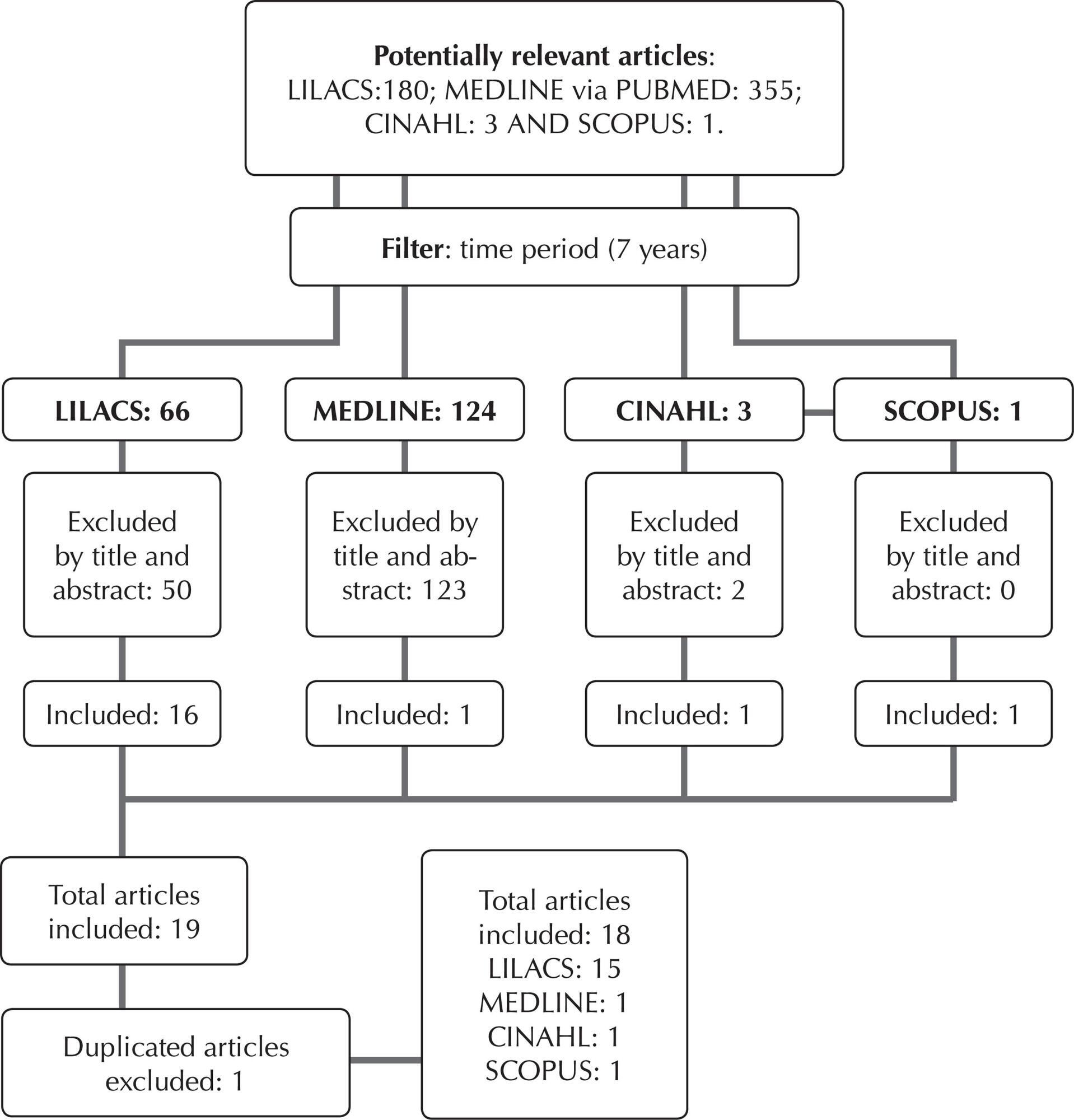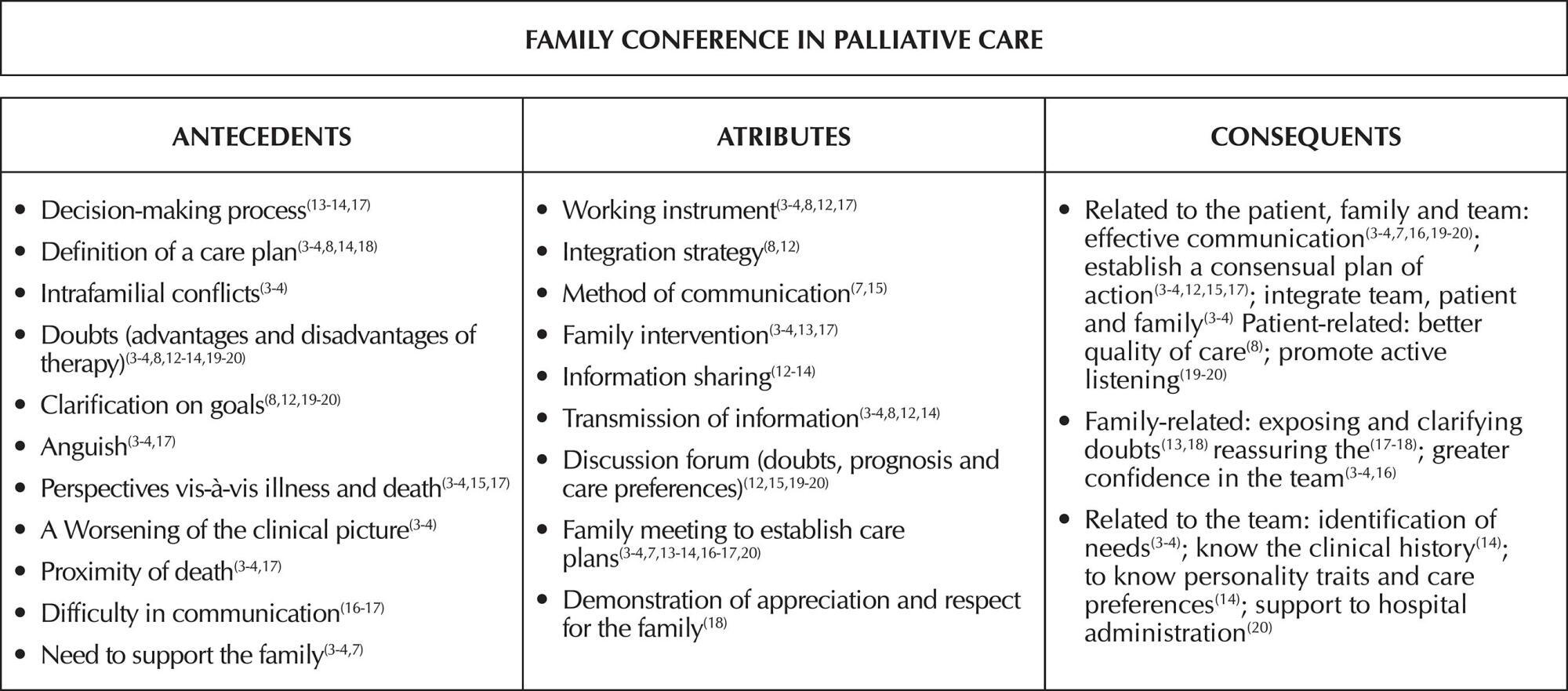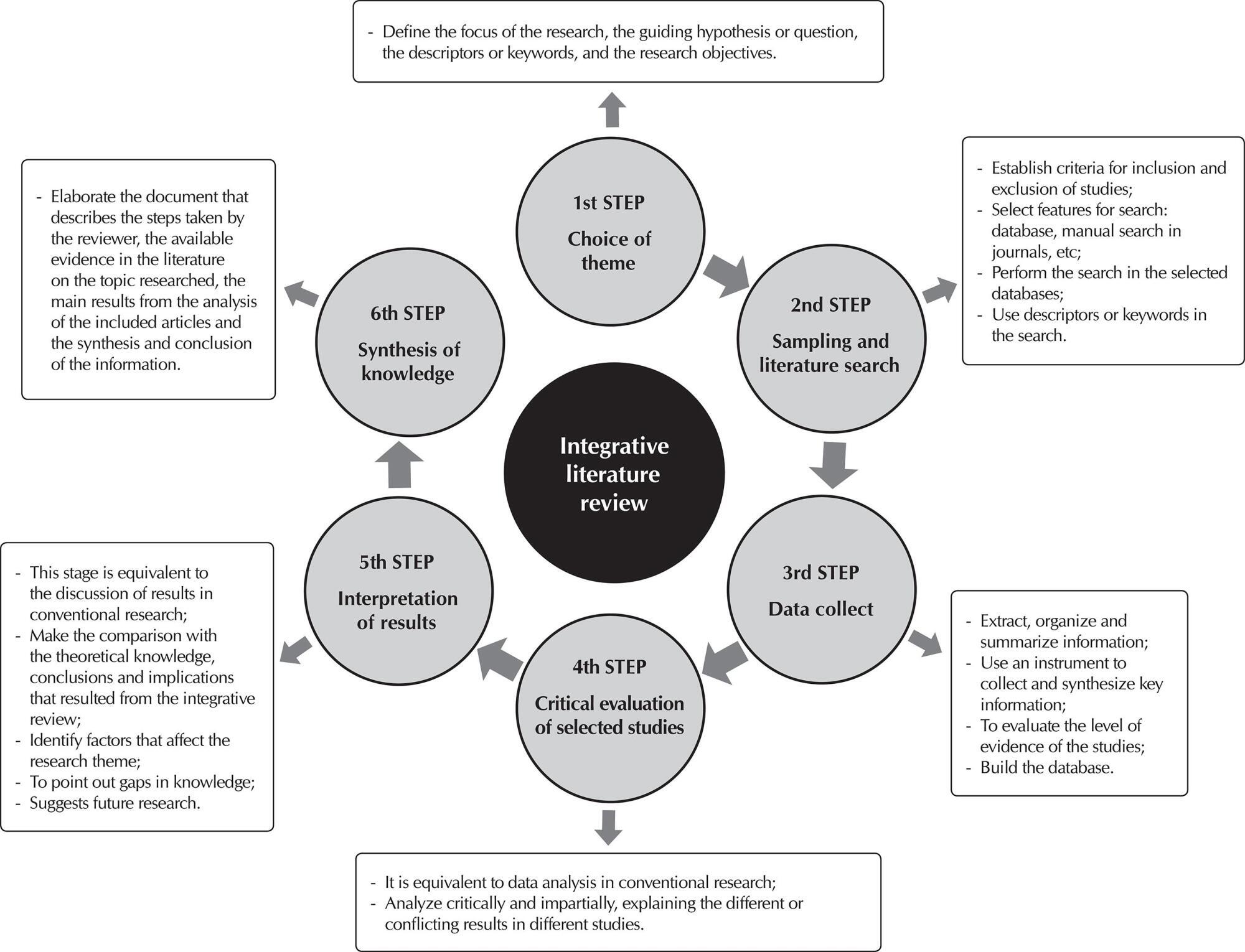-
RESEARCH01-01-2018
Primary care assessment from a male population perspective
Revista Brasileira de Enfermagem. 2018;71(2):236-243
Abstract
RESEARCHPrimary care assessment from a male population perspective
Revista Brasileira de Enfermagem. 2018;71(2):236-243
DOI 10.1590/0034-7167-2016-0651
Views1See moreABSTRACT
Objective:
to evaluate the quality of primary health care from the perspective of the male population.
Method:
a cross-sectional descriptive-evaluative study conducted at the family health units of Teresina, Piauí, Brazil, with the male population being interviewed through the Primary Care Assessment Tool (PCAT).
Results:
301 participants with mean age of 51.34 years, married, incomplete elementary school and monthly income between one and two minimum wages. The evaluation was positive for the following care domains: utilization, information system and longitudinality. The features access, comprehensiveness of care, service available and service provided, family centeredness and community orientation obtained a negative evaluation.
Conclusion:
the features of primary care are unsatisfactory, indicating the need to expand access to services offered and to qualify care for male users.
-
01-01-2018
Family and crisis: contributions of the systemic thinking for family care
Revista Brasileira de Enfermagem. 2018;71(2):234-235
Abstract
Family and crisis: contributions of the systemic thinking for family care
Revista Brasileira de Enfermagem. 2018;71(2):234-235
DOI 10.1590/0034-7167.2018710201
Views0The noun crisis comes from the Greek etymology, which means a dramatic change in a person’s or group’s life, as the familiar. It can also be perceived as a biological, social, psychological or spiritual disturbing tension that requires additional effort in order to maintain the balance(–).Families at different life cycle stages, from different configurations, and […]See more -
01-01-2018
Família e crise: contribuições do pensamento sistêmico para o cuidado familiar
Revista Brasileira de Enfermagem. 2018;71(2):234-235
Abstract
Família e crise: contribuições do pensamento sistêmico para o cuidado familiar
Revista Brasileira de Enfermagem. 2018;71(2):234-235
DOI 10.1590/0034-7167.2018710201
Views0Crise é um substantivo de etimologia grega, que pode ser explicada como sendo uma mudança brusca em algum dos aspectos da vida de uma pessoa, ou de um grupo, como o familiar. Também pode ser entendida como uma tensão perturbadora de ordem biológica, social, psíquica ou espiritual, que exige um esforço complementar para a manutenção […]See more -
EXPERIENCE REPORT01-01-2018
Theoretical saturation in qualitative research: an experience report in interview with schoolchildren
Revista Brasileira de Enfermagem. 2018;71(1):228-233
Abstract
EXPERIENCE REPORTTheoretical saturation in qualitative research: an experience report in interview with schoolchildren
Revista Brasileira de Enfermagem. 2018;71(1):228-233
DOI 10.1590/0034-7167-2016-0616
Views0See moreABSTRACT
Objective:
report the experience of applying the theoretical data saturation technique in qualitative research with schoolchildren.
Method:
critical reading of primary sources and compilation of raw data, followed by thematic grouping through colorimetric codification and allocation of themes/types of statements in charts to find theoretical saturation for each grouping.
Results:
colorimetric codification occurred according to previously established themes: bodily hydration; physical activities and play; handling of sickle-cell disease; feeding and clothing. On the eleventh interview, it was possible to reach the theoretical saturation of themes, with four additional interviews being performed.
Conclusion:
this experience report enabled the description of the five sequential steps for identification of theoretical data saturation in qualitative research conducted with schoolchildren.
-
EXPERIENCE REPORT01-01-2018
Advanced Practice Nursing in Pediatric Urology: experience report in the Federal District
Revista Brasileira de Enfermagem. 2018;71(1):223-227
Abstract
EXPERIENCE REPORTAdvanced Practice Nursing in Pediatric Urology: experience report in the Federal District
Revista Brasileira de Enfermagem. 2018;71(1):223-227
DOI 10.1590/0034-7167-2016-0654
Views0See moreABSTRACT
Objective:
To describe the creation and implementation of the extension program Advanced Practice Nursing in Pediatric Urology, developed in the outpatient clinic of a teaching hospital in the Federal District.
Method:
This is an experience report regarding the implementation of an outpatient service aimed at children and adolescents with symptoms of bladder and bowel dysfunction.
Results:
Because it is an extension program linked to the university, it follows a different model of care, valuing empowerment, informed and shared decision making, which results in a stronger bond between patients, family and the Pediatric Urology nursing team. It has also become a privileged space for the production and use of scientific knowledge, associated with the principles of evidence-based practice.
Conclusion:
This project shows a different performance of the nurse-specialist-professor-researcher in Pediatric Urology Nursing, and it has become a reference in the Federal District, mainly for undergraduate and graduate nursing students.
-
REVIEW01-01-2018
Analysis of Brazilian publications on distance education in nursing: integrative review
Revista Brasileira de Enfermagem. 2018;71(1):214-222
Abstract
REVIEWAnalysis of Brazilian publications on distance education in nursing: integrative review
Revista Brasileira de Enfermagem. 2018;71(1):214-222
DOI 10.1590/0034-7167-2016-0454
Views0INTRODUCTIONDistance Education (DE) is characterized by a teaching-learning process in which the relationship between teacher and student does not occur on physical plane. This strategy, besides allowing the use of technologies in education, stimulates multidirectional communication and the exchange of experiences/knowledge among the related subjects, while always aiming at the student as protagonist and the […]See more
-
REVIEW01-01-2018
Family conference in palliative care: concept analysis
Revista Brasileira de Enfermagem. 2018;71(1):206-213
Abstract
REVIEWFamily conference in palliative care: concept analysis
Revista Brasileira de Enfermagem. 2018;71(1):206-213
DOI 10.1590/0034-7167-2016-0055
Views0See moreABSTRACT
Objective:
to analyze the attributes, antecedents and consequents of the family conference concept.
Method:
Walker and Avante’s method for concept analysis and the stages of the integrative review process, with a selection of publications in the PubMed, Cinahl and Lilacs databases focusing on the family conference theme in the context of palliative care.
Results:
the most cited antecedents were the presence of doubts and the need to define a care plan. Family reunion and working instrument were evidenced as attributes. With respect to consequents, to promote the effective communication and to establish a plan of consensual action were the most remarkable elements.
Final considerations:
the scarcity of publications on the subject was observed, as well as and the limitation of the empirical studies to the space of intensive therapy. Thus, by analyzing the attributes, antecedents and consequents of the concept it was possible to follow their evolution and to show their efficacy and effectiveness as a therapeutic intervention.

-
REVIEW01-01-2018
Quality of life in adults with sickle cell disease: an integrative review of the literature
Revista Brasileira de Enfermagem. 2018;71(1):195-205
Abstract
REVIEWQuality of life in adults with sickle cell disease: an integrative review of the literature
Revista Brasileira de Enfermagem. 2018;71(1):195-205
DOI 10.1590/0034-7167-2016-0409
Views0See moreABSTRACT
Objective:
To identify the available evidence in the literature on health-related quality of life in adults with sickle cell disease.
Method:
integrative review of MEDLINE, CUMED, LILACS and SciELO databases, from articles developed in this area, published between 2005 and 2015, in English, Portuguese or Spanish.
Results:
22 articles were included, six scales were used to evaluate health-related quality of life scores: three generic and three specific. No specific scale for adults with sickle cell disease has been adapted to Brazilian Portuguese so far. Patients affected by frequent painful crises, with low adherence to treatment, had a compromised quality of life.
Conclusion:
Selected studies have shown that patients with sickle cell disease have worse scores than the general population. These indicators should be instrumental to the nurse in the proposal of interventions and strategies of assistance and socio-educational, with a view to improving the quality of life of this clientele.

-
ORIGINAL ARTICLE12-08-2023
Simulation-based training in Leprosy: development and validation of a scenario for community health workers
Revista Brasileira de Enfermagem. 2023;76:e20230114
Abstract
ORIGINAL ARTICLESimulation-based training in Leprosy: development and validation of a scenario for community health workers
Revista Brasileira de Enfermagem. 2023;76:e20230114
DOI 10.1590/0034-7167-2023-0114
Views0See moreABSTRACT
Objectives:
To build and validate a clinical simulation scenario designed to instruct community health workers (CHWs) in active leprosy case detection.
Methods:
Methodological study involving the development of a simulated clinical scenario and content validation by experts. The Content Validity Index (CVI) was used to determine the level of agreement among the judging commitee, and a descriptive analysis of their recommendations was performed.
Results:
A simulated scenario with a simulated participant was developed — a simulation characterized by low complexity, moderate physical/environmental fidelity, moderate to high psychological fidelity, and high conceptual fidelity, lasting 50 minutes and capable of training up to 10 CHWs simultaneously. The scenario was validated by 14 experts, with a CVI exceeding 80% for all components.
Conclusions:
The validated clinical simulation possesses attributes that make it highly reproducible in various national health contexts, thereby contributing to the global “Towards Zero Leprosy” strategy.
-
ORIGINAL ARTICLE12-08-2023
Knowledge and practices about health among Quilombola men: contributions to health care
Revista Brasileira de Enfermagem. 2023;76:e20230138
Abstract
ORIGINAL ARTICLEKnowledge and practices about health among Quilombola men: contributions to health care
Revista Brasileira de Enfermagem. 2023;76:e20230138
DOI 10.1590/0034-7167-2023-0138
Views1See moreABSTRACT
Objective:
to analyze health knowledge and practices among Quilombola men.
Methods:
a qualitative, descriptive study, carried out with 40 men from two Quilombola communities in Santa Izabel do Pará, state of Pará, Brazil. Individual interviews were carried out using a semi-structured script. Text corpus was subjected to analysis with Interface de R pour les Analyses Multidimensionnelles de Textes et de Questionnaires 0.6, alpha 3, through Descending Hierarchical Classification.
Results:
among participants, eight (20.00%) were aged 55 to 59 years. 382 text segments were identified, with 299 (78.27%) being used, generating five lexical classes, which made up two subcorpora. The classes were organized into four thematic axes, covering knowledge about health and practices to prevent and solve health problems.
Final considerations:
men highlighted popular/traditional wisdom permeated by biomedical knowledge, translating their understanding of how to act to remain or become healthy.

-
ORIGINAL ARTICLE10-06-2023
Ethical problems in nursing teleconsultations for people living with HIV during the Covid-19 pandemic
Revista Brasileira de Enfermagem. 2023;76:e20220754
Abstract
ORIGINAL ARTICLEEthical problems in nursing teleconsultations for people living with HIV during the Covid-19 pandemic
Revista Brasileira de Enfermagem. 2023;76:e20220754
DOI 10.1590/0034-7167-2022-0754
Views0See moreABSTRACT
Objectives:
to understand the ethical problems experienced by primary health care nurses in using nursing teleconsultations for people living with the human immunodeficiency virus during the coronavirus pandemic.
Methods:
qualitative research, anchored in Constructivist Grounded Theory. Data was collected between July and September 2020, with 17 participants.
Results:
the first category highlights the ethical problems in conducting teleconsultations, managing high demand, communication barriers, and risks related to data security. The second emphasizes the potential of teleconsultations in communication and access, by generating changes in the work process and the use of protocols to guide clinical practice.
Conclusions:
nurses’ work in digital mode requires professional qualification, with a view to stimulating reflection on teleconsultation practice, ethical-moral deliberation and combating stigma, and also adopting data security-centered conduct.
-
12-04-2023
Ethical dilemmas at the end of life: a reflection from the Philosophical Perspective of Luigina Mortari
Revista Brasileira de Enfermagem. 2023;76:e20220759
Abstract
Ethical dilemmas at the end of life: a reflection from the Philosophical Perspective of Luigina Mortari
Revista Brasileira de Enfermagem. 2023;76:e20220759
DOI 10.1590/0034-7167-2022-0759
Views0See moreABSTRACT
Objectives:
to reflect on the ethical dilemmas involved in the care of patients at the end of their lives.
Methods:
this is a theoretical-reflective study based on the ethics of care proposed by Luigina Mortari.
Results:
discussing care involves addressing the ways of being inherent to human existence and understanding the unique characteristics of this condition. Ethical care constitutes an action driven by interest in the other and by the perception of their need. Ethical dilemmas are a part of end-of-life care, making it essential to maintain respectful assistance that considers the patient’s autonomy, using strategies for expressing their wishes, and ensuring continuous clear and empathetic communication among all those involved in providing care.
Final Considerations:
issues related to being, stemming from one’s reality of dependency and vulnerability, contribute to the emergence of ethical dilemmas present in care actions.
-
ORIGINAL ARTICLE12-04-2023
Overview of nursing ethics teaching in Brazilian public higher education institutions
Revista Brasileira de Enfermagem. 2023;76:e20220808
Abstract
ORIGINAL ARTICLEOverview of nursing ethics teaching in Brazilian public higher education institutions
Revista Brasileira de Enfermagem. 2023;76:e20220808
DOI 10.1590/0034-7167-2022-0808
Views0See moreABSTRACT
Objectives:
to outline the teaching of ethics in undergraduate Nursing programs in Brazilian public higher education institutions.
Methods:
descriptive and exploratory study, carried out through the documentary analysis of pedagogical projects of undergraduate Nursing programs in Brazil.
Results:
153 active undergraduate Nursing programs were found, of which 106 provide the pedagogical project. In addition to deontological teaching, the teaching of ethics was identified in a transversal way associated with themes such as Social Context, Hospital and Community Care, Pharmacology, Systematization of Nursing Care, Surgical Nursing, Epidemiology, Palliative Care, Management in Nursing, Diversity, Women’s, Children’s, Adolescent’s, Adult’s and Older People’s Health, and Mental Health.
Final Considerations:
the challenge in teaching nursing ethics is its integration with each action of caring, teaching and managing.

-
ORIGINAL ARTICLE12-08-2023
Validation of telesimulation in the care of late preterm newborns with hypoglycemia for nursing students
Revista Brasileira de Enfermagem. 2023;76:20220438
Abstract
ORIGINAL ARTICLEValidation of telesimulation in the care of late preterm newborns with hypoglycemia for nursing students
Revista Brasileira de Enfermagem. 2023;76:20220438
DOI 10.1590/0034-7167-2022-0438
Views0See moreABSTRACT
Objective:
To develop and validate a telesimulation scenario for nursing students in the care of late preterm infants with hypoglycemia.
Methods:
A methodological study conducted between August 2021 and May 2022 in a virtual environment involved constructing and validating the scenario with 10 experts, and testing it with 10 students. The content validity index assessed validity, with a threshold of 80% or higher, and suggestions were analyzed using semantic approximation.
Results:
Validation confirmed the appropriateness of all 14 scenario items, with an overall index of 97.8% and clarity and relevance indices of 98.5%. During testing, the overall index was 99.7%, with the “resources” item receiving the lowest score. Adjustments were made to objectives, technical terms, resources, and target audience based on feedback.
Conclusion:
Telesimulation is a widely accepted educational technology for training nursing students, with potential to enhance teaching quality and neonatal care.
-
ORIGINAL ARTICLE11-10-2023
Construction and validity of educational technology in audiovisual media on premature newborn care
Revista Brasileira de Enfermagem. 2023;76:e20220403
Abstract
ORIGINAL ARTICLEConstruction and validity of educational technology in audiovisual media on premature newborn care
Revista Brasileira de Enfermagem. 2023;76:e20220403
DOI 10.1590/0034-7167-2022-0403
Views0See moreABSTRACT
Objectives:
to construct and validate an educational video storyboard about care for premature newborns at home.
Methods:
a methodological study, with the construction of an educational video storyboard, validated with 14 judges. Content was selected from scoping review. For data collection, a validated instrument was used. The criterion for validity was agreement greater than 80%, analyzed using the Content Validity Index.
Results:
the storyboard construction was guided by the Cognitive Theory of Multimedia Learning theoretical framework. Construction and validity took place from May to December 2020. The storyboard’s final version lasted 10 minutes, and was validated in terms of objective, structure, presentation and relevance, with a Content Validity Index of 0.9.
Conclusions:
the storyboard of the educational video proved to be valid and adequate for health promotion in developing care for premature newborns at home.

-
ORIGINAL ARTICLE12-08-2023
Early ambulation and dhikr complementary therapies effect on intestinal peristaltic in post-open cholecystectomy patients
Revista Brasileira de Enfermagem. 2023;76:e20220636
Abstract
ORIGINAL ARTICLEEarly ambulation and dhikr complementary therapies effect on intestinal peristaltic in post-open cholecystectomy patients
Revista Brasileira de Enfermagem. 2023;76:e20220636
DOI 10.1590/0034-7167-2022-0636
Views0ABSTRACT
Objectives:
to analyze and determine the effect of a combination intervention of early ambulation and dhikr therapy on intestinal peristaltic recovery in post-open cholecystectomy patients.
Methods:
a pre-experimental design with one group pre and post-test design was used. The samples were 15 post-open cholecystectomy patients which were selected using the purposive sampling technique. The data were collected using the instrument observation sheet and analyzed using the Wilcoxon test. Early ambulation used standard operational procedure in the hospital and dhikr therapy was carried out at 2 hours post-operation for 10-15 minutes.
Results:
there was an effect of early ambulation and dhikr therapy on intestinal peristaltic recovery in post-open cholecystectomy patients with general anesthesia (Z=-3.442; p=0.001).
Conclusions:
a combination of early ambulation and dhikr therapy can be recommended as interventions to improve intestinal peristaltic in a post-open cholecystectomy patient with general anesthesia.
Keywords:Anesthesia, GeneralCholecystectomyComplementary TherapiesEarly AmbulationPerioperative NursingSee more
Search
Search in:
Nuvem de Tags
Adolescente (85) Atenção Primária à Saúde (239) COVID-19 (91) Criança (91) Cuidados de Enfermagem (269) Educação em Enfermagem (151) Educação em Saúde (139) Enfermagem (930) Enfermagem Pediátrica (86) Estudantes de Enfermagem (77) Estudos de Validação (131) Família (87) Idoso (208) Promoção da Saúde (99) Qualidade de Vida (104) Saúde do Trabalhador (86) Saúde Mental (145) Saúde Pública (82) Segurança do Paciente (150) Tecnologia Educacional (100)



